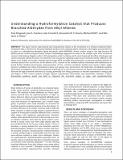Understanding a hydroformylation catalyst that produces branched aldehydes from alkyl alkenes
Abstract
This paper reports experimental and computational studies on the mechanism of a rhodium-catalysed hydroformylation that is selective for branched aldehyde products from unbiased alkene substrates. This highly unusual selectivity relies on a phospholane-phosphite ligand prosaically called BOBPHOS. Kinetic studies using in situ high pressure IR (HPIR) and the reaction progress kinetic analysis methodology suggested two steps in the catalytic cycle were involved as turnover determining. Negative order in CO and positive orders in alkene and H2 were found and the effect of hydrogen and carbon monoxide partial pressures on selectivity were measured. Labeling studies found rhodium hydride addition to the alkene to be largely irreversible. Detailed spectroscopic HPIR and NMR characterization of activated rhodium-hydrido dicarbonyl species were carried out. In the absence of H2, reaction of the rhodium-hydrido dicarbonyl with allylbenzene allowed further detailed spectroscopic characterization of four- and five-coordinate rhodium-acyl species. Under single-turnover conditions the ratios of branched to linear acyl species were preserved in the final ratios of aldehyde products. Theoretical investigations uncovered unexpected stabilizing CH-π interactions between the ligand and substrate which influenced the high branched selectivity by causing potentially low energy pathways to become unproductive. Energy span and degree of TOF control analysis strongly support experimental observations and mechanistic rationale. A three-dimensional quadrant model was built to represent the structural origins of regio- and enantioselectivity.
Citation
Dingwall , P , Fuentes , J A , Crawford , L , Slawin , A M Z , Buehl , M & Clarke , M L 2017 , ' Understanding a hydroformylation catalyst that produces branched aldehydes from alkyl alkenes ' , Journal of the American Chemical Society , vol. 139 , no. 44 , pp. 15921–15932 . https://doi.org/10.1021/jacs.7b09164
Publication
Journal of the American Chemical Society
Status
Peer reviewed
ISSN
0002-7863Type
Journal article
Description
The authors thank the EPSRC for funding (EP/M003868/1).Collections
Items in the St Andrews Research Repository are protected by copyright, with all rights reserved, unless otherwise indicated.

